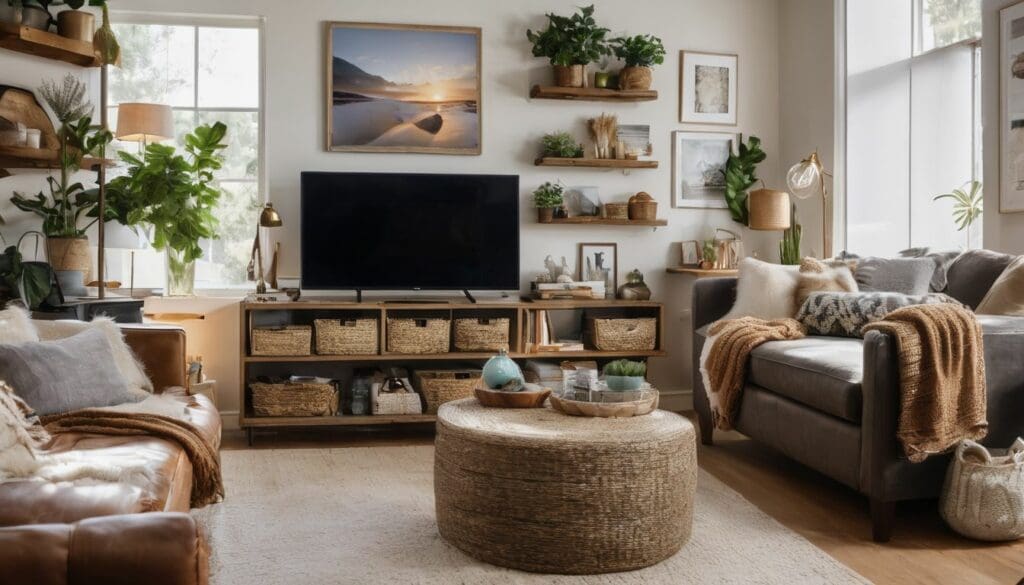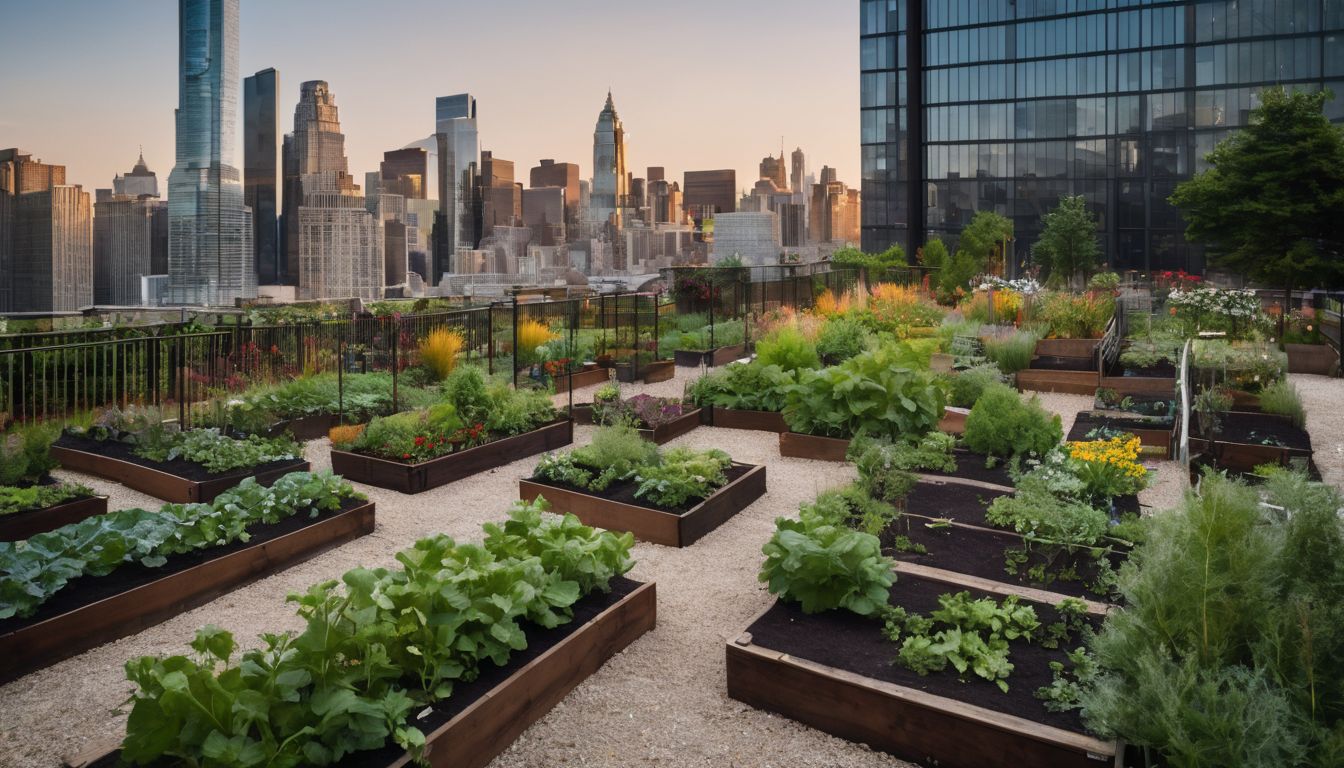Are you struggling to find ways to live a more sustainable lifestyle?
The growing trend of sustainability and DIY offers a solution.
This blog will explore the benefits of hosting a Sustainable DIY and Upcycling Workshop, promoting environmentally-friendly practices and encouraging creativity.
Join us as we delve into practical tips for planning and hosting your own eco-friendly workshop.
Key Takeaways
- Hosting a Sustainable DIY and Upcycling Workshop encourages individuals to adopt eco – friendly practices by repurposing old items into new treasures, reducing waste that would otherwise end up in landfills.
- Workshops provide the opportunity for participants to learn practical skills in zero-waste living, sustainable crafting techniques, and creative resourcefulness which are essential for an environmentally-conscious lifestyle.
- By offering a platform where like – minded people can share knowledge and ideas, these workshops help build a community focused on conservation efforts and mindful consumption habits.
- Planning your workshop involves finding an eco-friendly venue, selecting engaging themes such as “Eco-friendly Home Décor” or “Sustainable Fashion Upcycling”, and effectively marketing the event to attract interested parties.
- During the workshop, facilitators demonstrate various techniques using recycled materials while encouraging attendees to explore their creativity and contribute positively towards environmental sustainability.
The growing trend of sustainability and DIY
People everywhere are realising the power of sustainable living and the satisfaction that comes with DIY projects. They’re not just crafting for fun; they’re making a statement about eco-consciousness and responsibility towards our planet.
Through upcycling old materials, individuals transform neglected items into unique treasures while cutting down on waste. This surge in reuse and customisation reflects a shift towards greener lifestyles where every action counts.
To keep this momentum going, workshops focusing on zero waste practices and eco-friendly crafting provide essential skills for a sustainable lifestyle. By hosting these events, communities come together to share knowledge, learn new techniques in recycling, and inspire each other to live more sustainably.
Every successful project starts as a simple idea turned into reality by hands eager to make a difference – hands that build not just amazing DIY creations but also pave the way for an environmentally friendly future.
Why Host a Sustainable DIY and Upcycling Workshop?
Hosting a Sustainable DIY and Upcycling Workshop promotes environmentally-friendly practices, encourages creativity and resourcefulness, and attracts interested individuals looking to make more sustainable choices in their everyday lives.
Promoting environmentally-friendly practices
Promoting environmentally-friendly practices is at the heart of hosting a sustainable DIY and upcycling workshop. This type of event not only encourages participants to rethink their consumption habits but also shows them tangible ways to reduce waste in everyday life.
Instructors guide attendees on how to transform discarded items into functional art, highlighting the importance of reusing materials that might otherwise end up in landfill.
Attendees learn how easy it can be to incorporate eco-conscious decisions into their daily routines, from choosing plastic-free crafting supplies to repurposing old clothing instead of buying new.
Workshops like these pave the way for a zero-waste lifestyle and foster a deeper connection with environmental conservation efforts. By sharing skills on eco-friendly DIY projects, each workshop plays a vital role in spreading sustainability within the community.
Encouraging creativity and resourcefulness
It’s all about thinking outside the box and finding new ways to repurpose items. DIY and upcycling workshops encourage individuals to tap into their creative potential, transforming old or discarded materials into something unique and useful.
By embracing innovative ideas, participants can explore sustainable alternatives, reduce waste, and contribute positively to environmental conservation efforts. Creative expression meets practicality in these workshops, driving home the message that every small action counts towards a greener future.
To truly make a difference in living sustainably, it’s important to empower individuals with the skills needed for resourcefulness and creativity. The act of creating something beautiful out of salvaged materials not only fosters self-sufficiency but also encourages mindful consumption habits.
Attracting interested individuals
Encouraging creativity and resourcefulness can attract environmentally conscious individuals seeking to support conservation efforts. By offering a Sustainable DIY and Upcycling Workshop, you provide an opportunity for like-minded individuals to come together and learn new sustainable crafting techniques.
Emphasising the promotion of eco-friendly practices in your marketing materials will draw in those interested in green living, zero waste lifestyles, and plastic-free crafting tutorials.
Using keywords such as “sustainable lifestyle event” and “do-it-yourself environmentalism” can help reach your target audience of individuals looking to make a positive impact on the environment through creative means.
Planning Your Workshop
Search for a suitable venue, choose an engaging theme, and promote your sustainable DIY workshop to attract interested individuals. Read on to discover how to plan a successful event that promotes creativity and environmentally-friendly practices.
Finding a suitable venue
Search for a venue that aligns with your sustainable values. Consider spaces that champion eco-friendliness, such as community centres or environmentally conscious businesses. Look for locations with ample natural light and ventilation to reduce the need for artificial lighting and air conditioning.
Ensure the venue can accommodate the practical aspects of your workshop, like space for upcycling demonstrations and crafting activities.
Opt for a centrally located venue accessible by public transport or bike to minimise carbon emissions from travel. Additionally, inquire about the venue’s waste management practices to ensure they align with your sustainable goals.
Choosing a topic or theme
To engage participants, consider popular themes like “Eco-friendly Home Decor” or “Sustainable Fashion Upcycling“. Think about trending topics such as “Plastic-Free Living” or “Zero Waste Kitchen Crafting“.
Incorporate keywords from environmentally conscious individuals into your chosen theme to attract the right audience. Experiment with niche topics like “Natural Beauty Product DIYs” and “Upcycled Garden Projects”, catering to diverse interests within sustainable living.
Aim for a balance between practicality and creativity in your chosen theme, keeping it relevant, engaging, and inspiring for attendees.
Knowing what to expect
Prepare for an interactive and hands-on experience at the sustainable DIY and upcycling workshop. Participants can anticipate learning new crafting techniques, exploring innovative ideas for upcycling, and gaining inspiration from eco-friendly materials.
Get ready to engage in a supportive and creative environment where you can share your passion for sustainability with like-minded individuals. The workshop will provide a platform to exchange ideas, showcase creativity, and embrace the journey towards a more sustainable lifestyle.
During the event, attendees should be prepared to actively participate in DIY projects using recycled materials and contribute to reducing waste. The atmosphere will be filled with enthusiasm as everyone collaborates to create unique, environmentally conscious crafts that promote reuse and conservation.
Marketing and promoting your workshop
Spread the word about your sustainable DIY and upcycling workshop through social media, community notice boards, and local environmental groups. Use eye-catching posters featuring eco-friendly materials and catchy phrases to grab attention.
Collaborate with like-minded businesses to cross-promote the event on their platforms, reaching a wider audience interested in zero waste crafting sessions and plastic-free crafting tutorials.
Engage potential participants by sharing sneak peeks of upcycling ideas and inspiration that they can expect from the workshop across various social media channels.
Harness the power of online platforms to promote your sustainable lifestyle event using relevant hashtags such as #EcoCrafting or #SustainableLivingWorkshop. Encourage attendees to spread the word by offering incentives for referrals, creating buzz around your environmentally friendly DIY workshop within local communities passionate about conserving resources.
Sustainable Practices in DIY and Upcycling
Discover creative upcycling ideas and inspiration, learn how to reduce waste and promote reuse, and explore the use of eco-friendly materials in your crafting projects.
Upcycling ideas and inspiration
Explore a plethora of upcycling ideas and inspiration to kickstart your sustainable crafting journey. Transform old glass jars into charming lanterns, repurpose denim jeans into stylish tote bags, or revamp worn-out furniture with a fresh coat of eco-friendly paint.
Get creative with salvaged materials to create unique home decor, fashion pieces, and functional items while reducing waste and promoting reuse. Embrace the challenge of turning discarded items into something new and valuable through simple yet impactful upcycling projects that align with your zero-waste lifestyle.
Uncover innovative ways to breathe new life into everyday objects by embracing the principles of upcycling. From transforming scrap fabric into patchwork quilts to converting empty tin cans into vibrant plant pots, let sustainability guide your creativity as you embark on a journey towards plastic-free crafting and eco-conscious living.
Reducing waste and promoting reuse
To reduce waste and promote reuse, consider incorporating upcycling and repurposing activities into your sustainable DIY workshop. Encourage participants to bring old or unused materials that can be given a new life through creative projects.
Additionally, emphasise the importance of choosing sustainable materials and reducing single-use items in their crafting endeavours. By focusing on these principles, you can inspire individuals to adopt eco-friendly practices in their daily lives while fostering a sense of environmental responsibility within your community.
Implementing zero-waste strategies such as utilising leftover fabric scraps, repurposing glass jars for storage, and transforming old clothing into new fashion pieces showcases the unlimited potential for reuse and minimises unnecessary waste.
Using eco-friendly materials
Transitioning from the focus on reusing and reducing waste, using eco-friendly materials further enhances the sustainability of DIY and upcycling projects. Choose natural or recycled materials such as organic fabrics, reclaimed wood, or repurposed glass to minimise environmental impact.
Opt for non-toxic paints, adhesives, and finishes to ensure a healthier indoor environment for both yourself and your workshop participants.
Encourage sustainable living by incorporating keywords like “plastic-free crafting,” “upcycling with repurposed materials,” and “zero-waste DIY” in your workshop’s title and promotional materials.
Hosting the Workshop
Provide necessary materials and tools, demonstrate DIY techniques, and encourage participants to unleash their creativity through upcycling and sustainable crafting – learn more about hosting a Sustainable DIY and Upcycling Workshop.
Providing necessary materials and tools
Equip your sustainable crafting workshop with an array of eco-conscious materials and tools, such as recycled fabrics, biodegradable adhesives, and natural dyes. Stock up on reusable items like glass jars, wooden frames, and metal canisters to inspire zero waste creativity.
Offer an assortment of plant-based paints, bamboo knitting needles, and sustainably sourced yarn for plastic-free crafting tutorials that align with the ethos of the event.
Ensure participants have access to DIY-friendly essentials such as screwdrivers, sewing kits, glue guns, and ergonomic scissors made from recycled steel. Display an inviting array of repurposed items like vintage buttons, reclaimed wood scraps for upcycling projects or recycling classes.
Demonstrating DIY techniques
Show participants how to repurpose old items with our upcycling demonstrations. Teach attendees the art of turning everyday objects into something new and useful. Emphasise eco-friendly practices such as using reclaimed materials and reducing waste.
Encourage creative thinking by demonstrating various techniques, such as decoupage, stencilling, and simple carpentry skills. Show how small changes can make a big impact on the environment.
Equip participants with the knowledge and skills to transform discarded items into beautiful, functional pieces through engaging demonstrations. Demonstrations will include step-by-step instructions on repurposing furniture, creating decor from scrap fabric or wood, or transforming glass jars into stylish containers.
Encouraging participants to get creative
After demonstrating DIY techniques, challenge participants to unleash their creativity by coming up with their own unique upcycling ideas. Encourage them to think outside the box and experiment with different materials and methods.
Provide a supportive environment where individuals can freely express themselves through sustainable crafting, reinforcing the importance of reusing and repurposing items.
During the workshop, facilitate brainstorming sessions to inspire innovative solutions for reducing waste and promoting eco-friendly living. Emphasise the value of creative thinking in finding alternative uses for everyday objects, fostering a sense of empowerment and accomplishment among attendees.
Conclusion
Emphasising the impact of small sustainable choices and promoting a sense of community and creativity can lead to positive environmental change. By hosting a Sustainable DIY and Upcycling Workshop, you can inspire others to make eco-friendly choices in their everyday lives.
Emphasising the impact of small sustainable choices
Choosing to embrace small sustainable choices can lead to significant positive impacts on the environment. Making conscious decisions such as upcycling old materials, reducing single-use plastics, and embracing reusable options can contribute to a reduction in waste and ultimately help protect our planet’s natural resources.
By actively participating in sustainable practices like DIY upcycling and reusing materials, individuals play a vital role in promoting environmental conservation.
Engaging in eco-conscious activities not only minimises the negative impact on the environment but also fosters a sense of responsibility towards sustainable living. Small actions taken collectively have the potential to bring about meaningful change, creating a ripple effect that inspires others to adopt similar environmentally friendly practices.
Promoting a sense of community and creativity.
Promote a sense of community and creativity by fostering collaboration and sharing ideas. Encourage participants to engage with one another, sparking inspiration for future sustainable projects.
Emphasise the value of diverse perspectives and experiences in cultivating an environment where creativity thrives.
Foster a strong sense of community by providing opportunities for individuals to connect through their shared passion for sustainability. Create a welcoming space that allows everyone to feel heard and valued, promoting an inclusive atmosphere where creative solutions can flourish.
FAQs
1. What is a Sustainable DIY and Upcycling Workshop?
A sustainable DIY and upcycling workshop is an event where you learn how to create new items from old ones, promoting zero waste and eco-conscious living.
2. How can I make my DIY event plastic-free?
To host a plastic-free crafting tutorial, choose materials that are natural or reusable and avoid any single-use plastics in your projects.
3. What will I learn at an upcycling and recycling class?
At an upcycling class, you’ll discover ways to transform unwanted materials into useful products, thereby practising reuse for sustainable living.
4. Why should I attend a DIY upcycling seminar?
Attending a do-it-yourself upcycling seminar equips you with skills to repurpose everyday objects responsibly while contributing to the eco-conscious movement.





